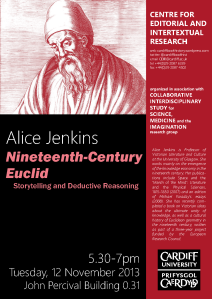Alice Jenkins (University of Glasgow) will be presenting her paper, ‘Nineteenth-Century Euclid: Storytelling and Deductive Reasoning’, at 5.30pm on Tuesday, 12 November 2013. The talk will take place in the Cardiff University’s John Percival Building, Room 0.31, and is co-hosted by the Centre for Editorial and Intertextual Research and the Collaborative Interdisciplinary Study for Science, Medicine and the Imagination (CISSMI) research network.
 Abstract
Abstract
‘Detection is, or ought to be, an exact science and should be treated in the same cold and unemotional manner. You have attempted to tinge it with romanticism, which produces much the same effect as if you worked a lovestory or an elopement into the fifth proposition of Euclid.’
Holmes’s expostulation to Watson in The Sign of Four embodies a conventional Victorian view of the purity of mathematics as utterly distinct from the flim-flam of fiction. Does an attempt to read Victorian mathematics in the context of literary culture carry the principles of literature and science studies too far? Had the period’s mathematics any significant relationship with affect, rhetoric, poetics, ambiguity, those qualities we think of as basic to literature? In particular, what kinds of relationship can a deductive science have with narrative? In this paper I explore some of the ways in which Victorian writers grappled with mathematics and tried to tell deductive stories.
About the speaker
 Alice Jenkins is Professor of Victorian Literature and Culture and works mainly on the emergence of the knowledge economy in the nineteenth century. Publications include Space and the ‘March of Mind’: Literature and the Physical Sciences, 1815-1850 (OUP, 2007) and an edition of Michael Faraday’s essays, Michael Faraday’s ‘Mental Exercises’: An Artisan Essay-Circle in Regency London (Liverpool UP, 2008). She co-founded the British Society for Literature and Science in 2005. She has recently completed a book on Victorian ideas about the ultimate unity of knowledge, as well as a cultural history of Euclidean geometry in the nineteenth century, which was written as part her three-year research project, ‘Nineteenth-Century Euclid’, funded by the European Research Council.
Alice Jenkins is Professor of Victorian Literature and Culture and works mainly on the emergence of the knowledge economy in the nineteenth century. Publications include Space and the ‘March of Mind’: Literature and the Physical Sciences, 1815-1850 (OUP, 2007) and an edition of Michael Faraday’s essays, Michael Faraday’s ‘Mental Exercises’: An Artisan Essay-Circle in Regency London (Liverpool UP, 2008). She co-founded the British Society for Literature and Science in 2005. She has recently completed a book on Victorian ideas about the ultimate unity of knowledge, as well as a cultural history of Euclidean geometry in the nineteenth century, which was written as part her three-year research project, ‘Nineteenth-Century Euclid’, funded by the European Research Council.